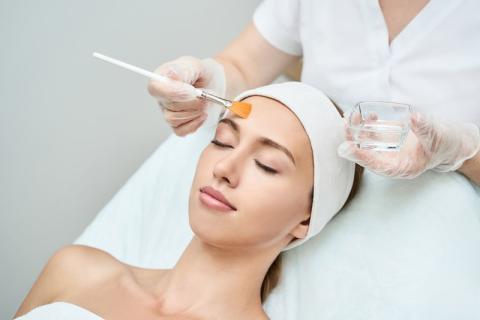
Chemical Peels are effective exfoliating treatments that are perfect to give your skin that youthful boost. By gently removing the old skin layers to reveal brighter and healthier skin underneath, it leaves the skin highly sensitive. And therefore it is important for us to take care of our skin in the correct manner after a chemical peel. Here is your ultimate Post Chemical Peel Skincare Guide-
Wash your face with cool water
Since your skin will be sensitive for 5-7 days, washing your face with cool water is recommended as it can help soothe the skin due to post-peel sensations and be a soothing alternative for your healing skin. While hot or warm water may cause inflammation, especially on sensitive skin. It’s important to remember to pat your skin dry.
Moisturize and hydrate.
After the chemical peel treatment, your skin will be sensitive, and hence it's important to use moisturizers with mild ingredients, with the aim of not irritating your skin. Allowing the skin layers to dry out without this moisturizer may cause some discomfort. The moisturizer should be reapplied to the skin gently throughout the day. A water-based moisturizer is usually recommended.
Along with moisturizing, you must also remember to constantly rehydrate yourself by drinking water which helps makes your skin feel tight.
Apply sunscreen with SPF30 or more.
Your skin is at its most sensitive post-peel, so you must take all the possible precautions before exposing it to direct sun and UV rays. The chemical peel helped get rid of damaged skin and hence it's important to remember to avoid damaging these new layers being exposed. This new skin must be protected by applying a sunscreen of SPF30 or more. Direct exposure to the sun rays could lead to more visible signs of skin aging
Avoid strenuous workouts, dry saunas, and steam rooms.
Warming, tingling, itching, redness, and other unpleasant side effects of freshly peeled skin can be aggravated by the increased blood circulation to the face. On the day you use a peel, avoid such activities.
Don’t over-exfoliate
Since peels themselves are great exfoliating agents, 3-4 days post a chemical peel, there is no need to separately exfoliate using a scrub, brush, or a cleanser. Over-exfoliating can damage the skin leading to redness due to inflammation and increased sensitivity.
Safe exfoliation can be done as soon as the skin is no longer hypersensitive.
Hands Off your face!
A chemical peel's main goal is to pull up and slough off damaged skin cells, revealing healthy, glowing skin beneath. Avoid touching, picking, or scratching the dead skin with your fingers when it begins to shed. Allow the dead skin to shed naturally, and avoid peeling it off with your fingers – using your fingers to remove the dead skin may result in scarring.
Pull the Hair back
After a chemical peel, your skin is highly sensitive and hence it is best not to touch it, pulling your hair back can prevent it from touching your face and indirectly prevent breakouts. It is critical to allow the skin to naturally peel without accidentally contacting your skin while brushing your hair back. Making contact with your hypersensitive skin with your already dirty fingers may lead to inflammation and hence breakouts.
Stick to soap-free cleansers
Soap-free cleansers are ideal for sensitive skin, especially after a chemical peel. One must ensure that it isn't too drying as the new layers of skin need constant moisturization. Soap isn't recommended as it tends to strip the skin of its natural oils, which already occurs due to exfoliation using a chemical peel.
Remember, the practitioner knows best
It is smart to always listen to your dermatologist/ skincare specialist after the chemical peel. They will have the ability to give tailor-made instructions according to your specific case that is best suited for your skin type and the type of chemical peel you’ve had. They may even recommend specific products to help heal your skin
Using these tips will help us maximize the effects of the treatment and minimize any post-treatment damage we could possibly cause to the skin.
